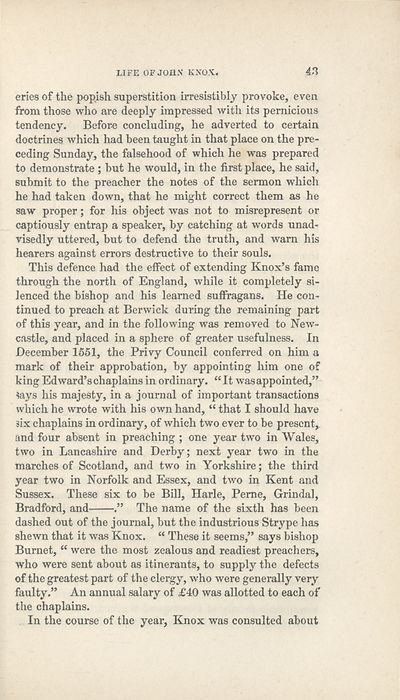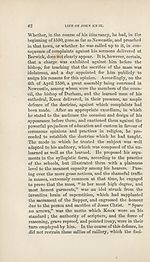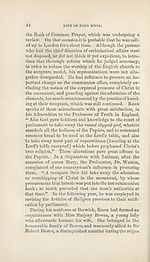Download files
Complete book:
Individual page:
Thumbnail gallery: Grid view | List view

LIFE OF JOHN KNOX.
4.'?
eries of the popish superstition irresistibly provoke, even
from those who are deeply impressed with its pernicious
tendency. Before concluding, he adverted to certain
doctrines which had been taught in that place on the pre¬
ceding Sunday, the falsehood of which he was prepared
to demonstrate ; but he would, in the first place, he said,
submit to the preacher the notes of the sermon which
he had taken down, that he might correct them as he
saw proper; for his object was not to misrepresent or
captiously entrap a speaker, by catching at words unad¬
visedly uttered, but to defend the truth, and warn his
hearers against errors destructive to their souls.
This defence had the effect of extending Knox’s fame
through the north of England, while it completely si¬
lenced the bishop and his learned suffragans. He con¬
tinued to preach at Berwick during the remaining part
of this year, and in the following was removed to New¬
castle, and placed in a sphere of greater usefulness. In
December 1551, the Privy Council conferred on him a
mark of their approbation, by appointing him one of
king Edward’s chaplains in ordinary. “ It wasappointed,”
tays his majesty, in a journal of important transactions
which he wrote with his own hand, “ that I should have
six chaplains in ordinary, of which two ever to be present,,
and four absent in preaching ; one year two in Wales,
two in Lancashire and Derby; next year two in the
marches of Scotland, and two in Yorkshire; the third
year two in Norfolk and Essex, and two in Kent and
Sussex. These six to be Bill, Harle, Feme, Grindal,
Bradford, and .” The name of the sixth has been
dashed out of the journal, hut the industrious Strype has
shewn that it was Knox. “ These it seems,” says bishop
Burnet, “ were the most zealous and readiest preachers,
who were sent about as itinerants, to supply the defects
of the greatest part of the clergy, who were generally very
faulty.” An annual salary of £40 was allotted to each of
the chaplains.
In the course of the year, Knox was consulted about
4.'?
eries of the popish superstition irresistibly provoke, even
from those who are deeply impressed with its pernicious
tendency. Before concluding, he adverted to certain
doctrines which had been taught in that place on the pre¬
ceding Sunday, the falsehood of which he was prepared
to demonstrate ; but he would, in the first place, he said,
submit to the preacher the notes of the sermon which
he had taken down, that he might correct them as he
saw proper; for his object was not to misrepresent or
captiously entrap a speaker, by catching at words unad¬
visedly uttered, but to defend the truth, and warn his
hearers against errors destructive to their souls.
This defence had the effect of extending Knox’s fame
through the north of England, while it completely si¬
lenced the bishop and his learned suffragans. He con¬
tinued to preach at Berwick during the remaining part
of this year, and in the following was removed to New¬
castle, and placed in a sphere of greater usefulness. In
December 1551, the Privy Council conferred on him a
mark of their approbation, by appointing him one of
king Edward’s chaplains in ordinary. “ It wasappointed,”
tays his majesty, in a journal of important transactions
which he wrote with his own hand, “ that I should have
six chaplains in ordinary, of which two ever to be present,,
and four absent in preaching ; one year two in Wales,
two in Lancashire and Derby; next year two in the
marches of Scotland, and two in Yorkshire; the third
year two in Norfolk and Essex, and two in Kent and
Sussex. These six to be Bill, Harle, Feme, Grindal,
Bradford, and .” The name of the sixth has been
dashed out of the journal, hut the industrious Strype has
shewn that it was Knox. “ These it seems,” says bishop
Burnet, “ were the most zealous and readiest preachers,
who were sent about as itinerants, to supply the defects
of the greatest part of the clergy, who were generally very
faulty.” An annual salary of £40 was allotted to each of
the chaplains.
In the course of the year, Knox was consulted about
Set display mode to:
![]() Universal Viewer |
Universal Viewer | ![]() Mirador |
Large image | Transcription
Mirador |
Large image | Transcription
| Antiquarian books of Scotland > Scotland/Scots > Life of John Knox ; and, The life of Alexander Henderson > (61) |
|---|
| Permanent URL | https://digital.nls.uk/131833036 |
|---|
| Description | Thousands of printed books from the Antiquarian Books of Scotland collection which dates from 1641 to the 1980s. The collection consists of 14,800 books which were published in Scotland or have a Scottish connection, e.g. through the author, printer or owner. Subjects covered include sport, education, diseases, adventure, occupations, Jacobites, politics and religion. Among the 29 languages represented are English, Gaelic, Italian, French, Russian and Swedish. |
|---|

